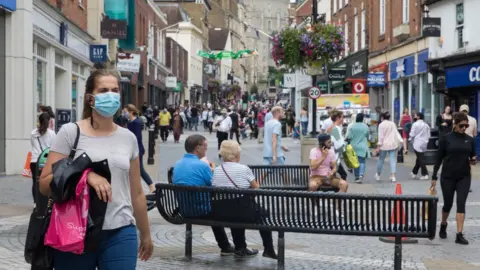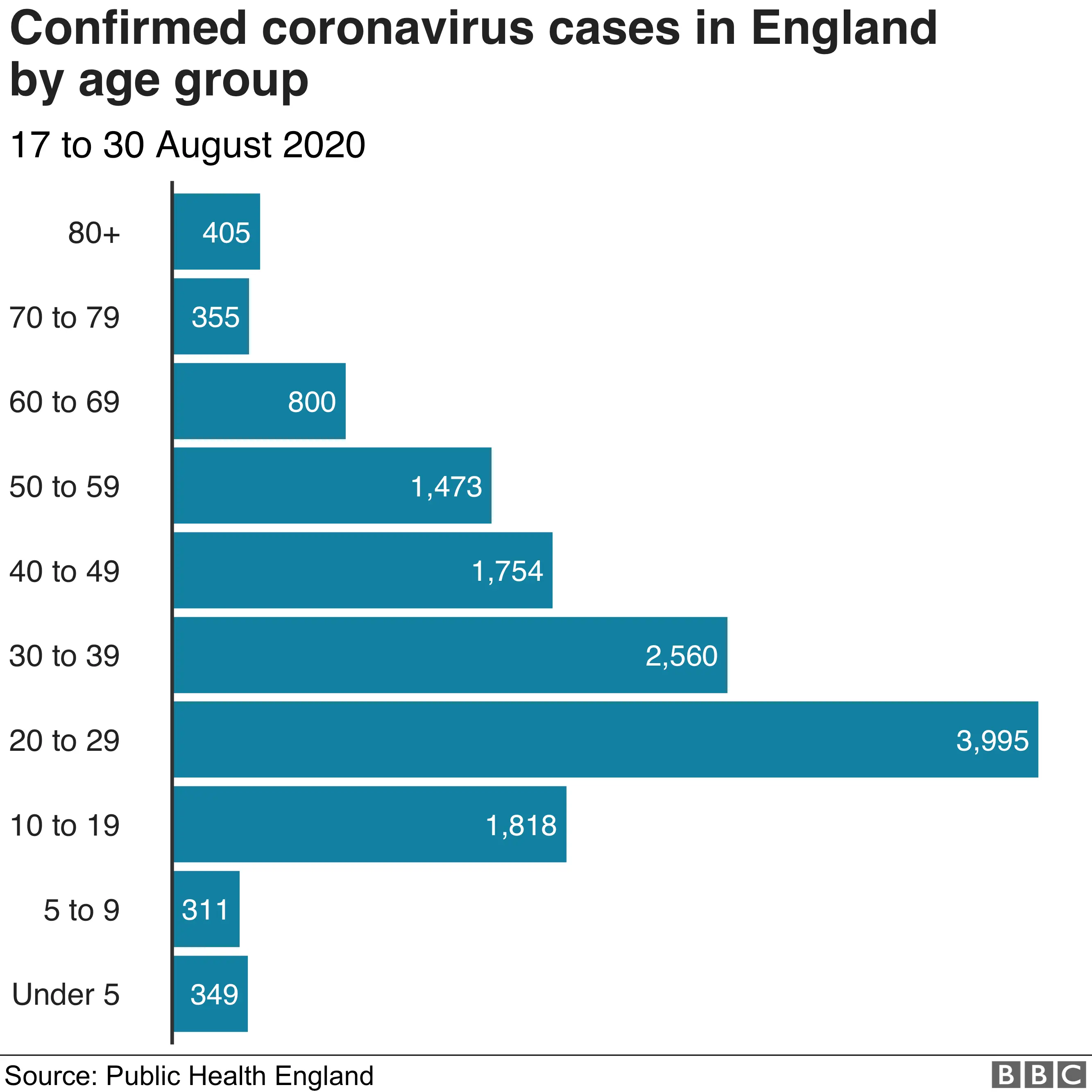Coronavirus: Hancock concern over 'sharp rise' in cases
 Getty Images
Getty ImagesA "sharp rise" in coronavirus cases in recent days in the UK is "concerning", Health Secretary Matt Hancock has said.
He told MPs that the increase had been across the whole country rather than in localised "hotspots", but there was "no inevitability" of a second spike.
The government's scientific advisers have given stark warnings, after 2,948 new UK cases were recorded on Monday.
Downing Street said it would not rule out reducing the number of people who could meet in groups in England.
Asked whether the government was considering a change in guidance, the prime minister's official spokesman said the regulations were being kept under review.
The guidance in England currently says two households can meet indoors. Outdoors up to six people from different households can meet - or up to 30 people from two households.
Ministers have singled out young people in particular for not following social-distancing rules.
England's chief medical officer, Prof Chris Whitty, said Covid-19 rates are now rising, especially amongst people aged between the ages of 17 and 29.
He warned that if people stopped social distancing then "Covid comes back".
But another expert cited the government's "confused messaging" and said it was unfair to blame the young.
On Sunday 2,988 new cases were announced - the highest figure since 22 May.
At the peak of the virus in spring official figures showed there were 6,000 cases a day, although testing was largely only taking place in hospitals.
Estimates suggest there were around 100,000 cases a day at that point.
Mr Hancock told MPs on the Commons Health Select Committee it was "so important that people take their responsibilities seriously, and people don't become relaxed about this virus".
He said the government's strategy was clear, with the first line of defence being social distancing, followed by testing and tracing, and then local action.
He added: "I have taken quite robust action in areas where there are local spikes. I don't like doing that but I don't resile from doing it because it is necessary."


He also told the committee that the first "credible" cases of coronavirus reinfection were starting to be seen.
"Through genomic analysis you can see it is a different disease to the one the person got the first time around," he said.
"But in all the cases that I have seen it has been an asymptomatic second infection that has been picked up through asymptomatic testing."
On Monday Mr Hancock warned the UK could see a second spike in coronavirus cases if young people did not follow the rules.
His comments were echoed by Housing Secretary Robert Jenrick, who said there was a particular responsibility on younger people to follow government guidelines on Covid-19, so that infection rates would not spike again.
"We have to keep hammering the message home. Of course the people in those age categories are unlikely to become extremely unwell as a result of having the virus.
"But they are able to pass it on to others," he said.
"There's a responsibility on younger people to not just stay at home, obviously to go out and go to work and to enjoy pubs and restaurants, but to do so in accordance with the guidelines."
Mr Jenrick also said the UK was entering a "period of particular concern" with the number of coronavirus cases rising, adding "we all have to be very cautious".
However, Prof Susan Michie, a behavioural expert on the government's Scientific Advisory Group for Emergencies (Sage), was critical of the government's "confused messaging" over the coronavirus restrictions.
She told the BBC News Channel that the constant changing of the guidance and variations between nations had left young people "very confused about what it is they are and aren't meant to be doing".
She said ministers had almost signalled "go out and about as usual" to young people by lifting restrictions and added it was unfair to then say "actually you are the problem" rather than take any responsibility as a government for the messaging.


Another Sage member, Prof Andrew Hayward, told Radio 4's Today programme he was worried that the rise in virus cases over the last few days might "get out of hand" if control measures were not taken seriously.
He added: "Generally it is local outbreaks, but there is also very worrying increases in cases, particularly over the last few days."
On Monday, his Sage colleague Prof Van Tam described the latest change in coronavirus infections across the UK as a "great concern", adding: "People have relaxed too much. Now is the time for us to re-engage, and to realise that this a continuing threat to us."
England's chief medical officer Prof Chris Whitty reiterated concerns raised by his deputy Prof Van-Tam about a rise in cases.
He tweeted: "We have, through the extraordinary efforts of the whole population, got Covid rates right down. They are now rising again especially in those aged 17 to 29.
"If we stop social distancing Covid comes back."
Lowest level
Meanwhile, official weekly figures show the number of deaths linked to coronavirus have fallen to their lowest level since mid-March.
A total of 101 deaths were registered during the week ending 28 August, according to the Office for National Statistics.
The Sage scientists' warnings come as more parts of the UK face tougher restrictions following a rise in the number of cases.
In Wales, the county borough of Caerphilly is to be placed under a local lockdown from 18:00 BST on Tuesday, lasting until at least October.
Welsh Health Minister Vaughan Gething blamed a breakdown in social distancing, especially among extended households.
Stricter rules on visiting other people's homes were also extended to two more areas in the west of Scotland from midnight.

- THE R NUMBER: What it means and why it matters
- TESTING: What tests are available?
- LOOK-UP TOOL: How many cases in your area?
- LOCAL LOCKDOWNS: What happens if you have one?
- SOCIAL LIFE: Is it safe to go to the pub?

Meanwhile, council leaders in north-east England have said the average number of new cases in the region has doubled to about 80 per day, in just over a week.
A joint statement from seven council leaders said: "We have seen cases where individuals with symptoms have had a test, then gone out and infected others before getting their results - reckless and selfish behaviour."

- THE NAKED SCIENTISTS: Where did COVID-19 come from?
- THE SECRET LIFE OF TEACHERS: What's it like returning to classrooms amid a global pandemic?

